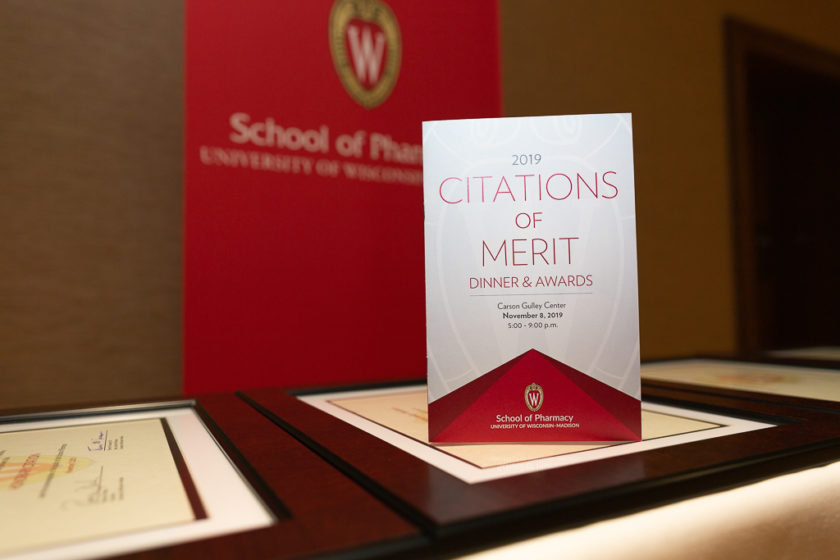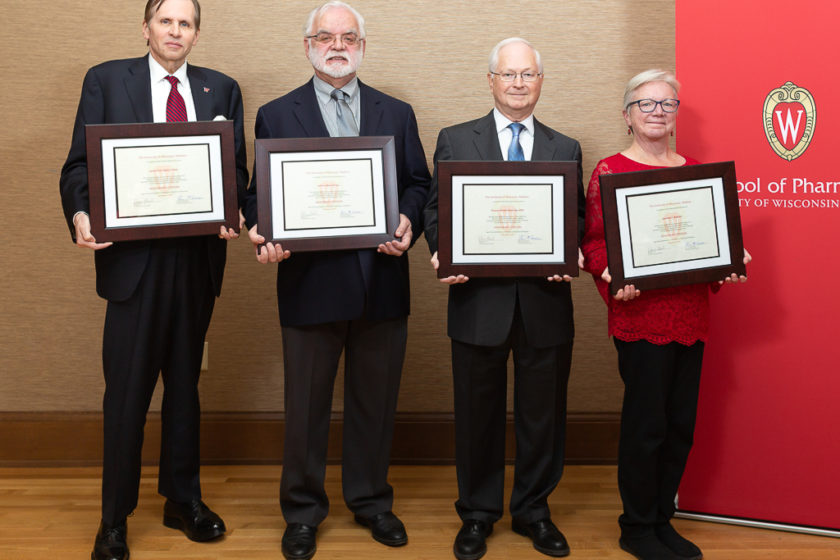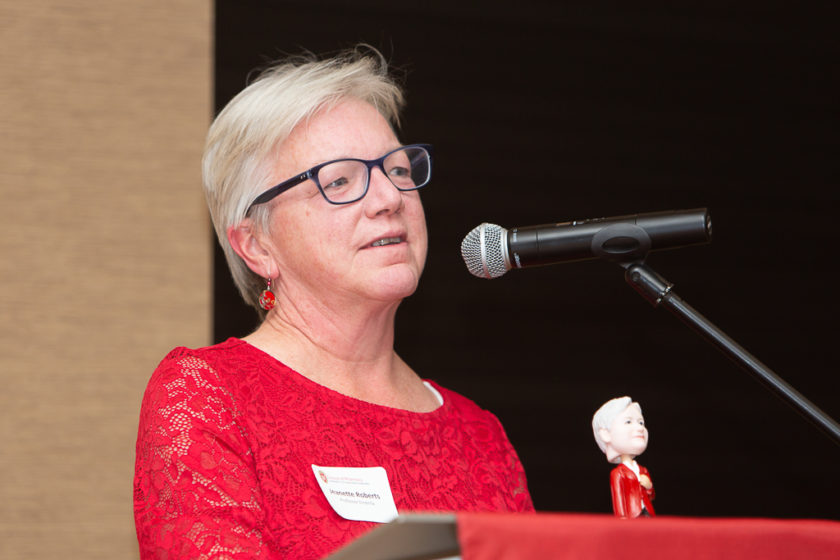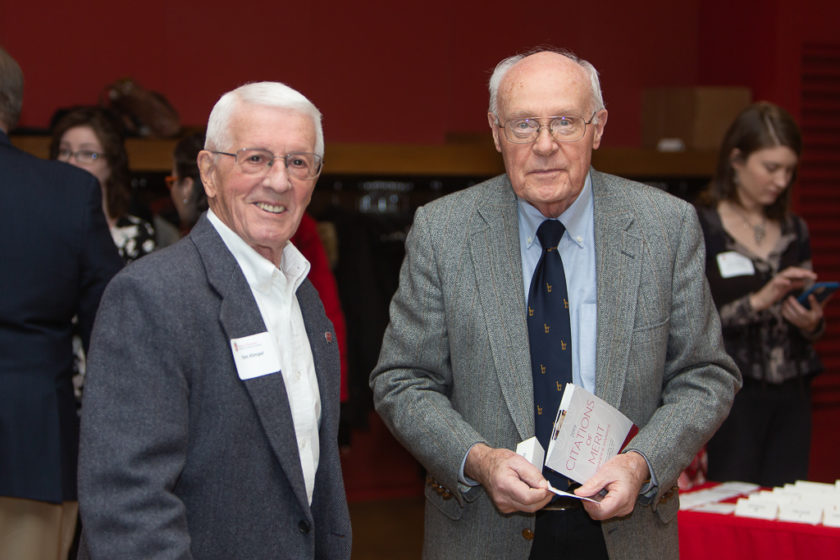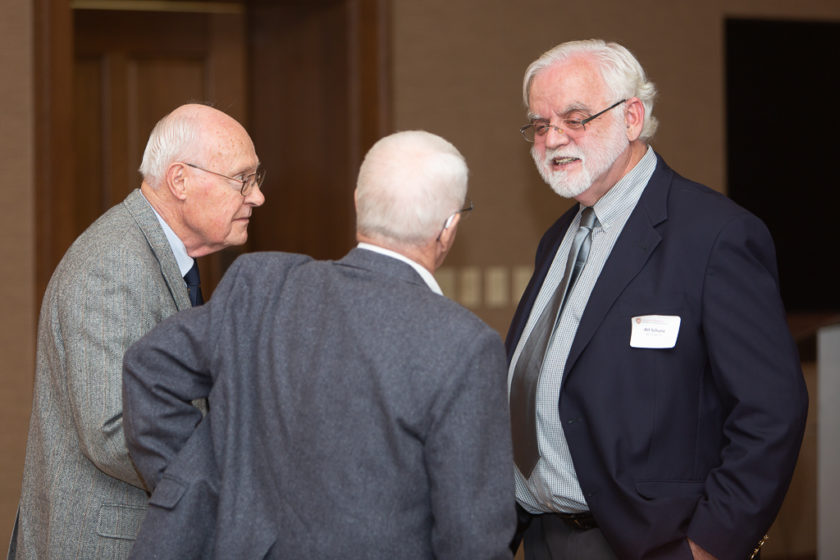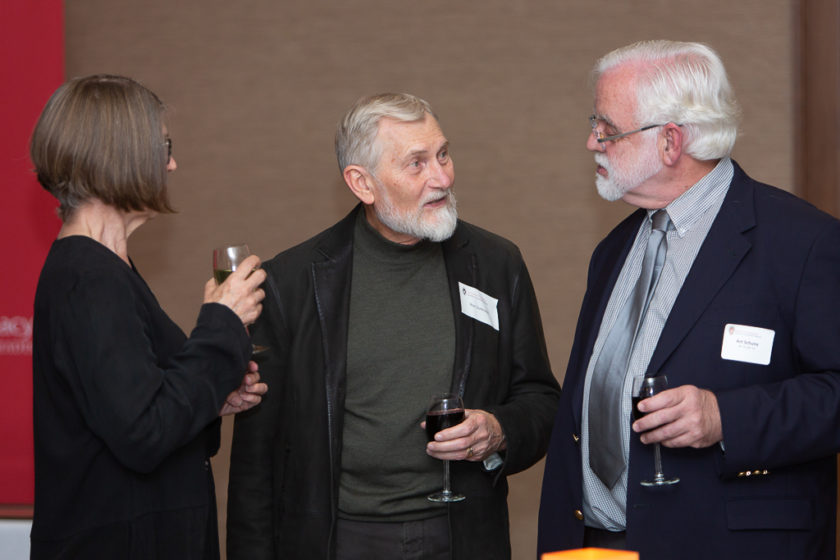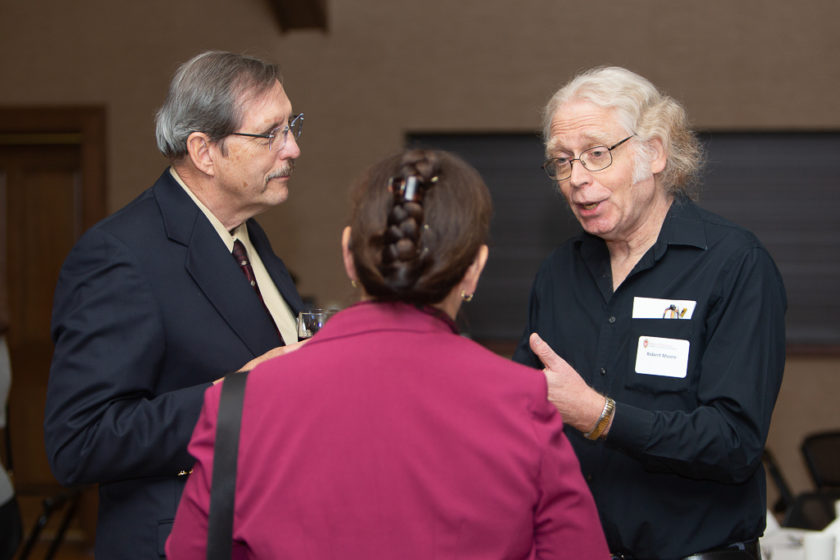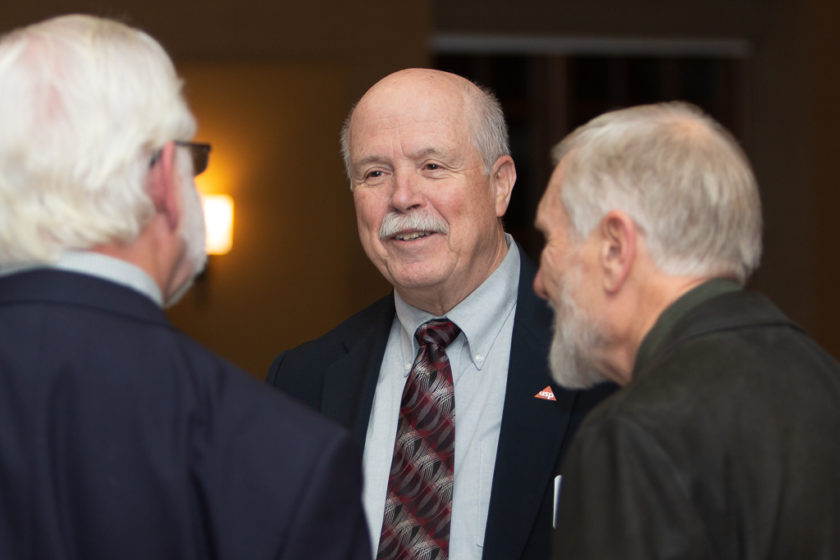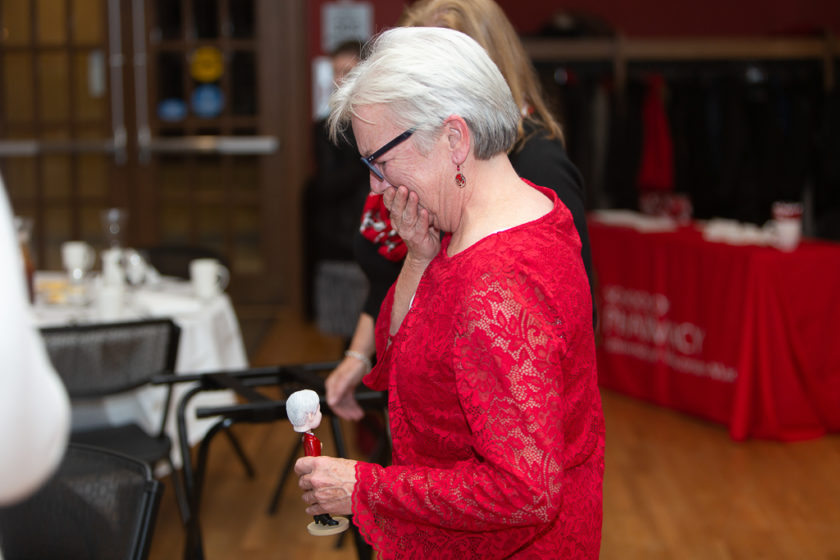School of Pharmacy honors former dean and three Badger alumni
By Katie Ginder-Vogel
Photos by Todd Brown
There is only one school or department of the University of Wisconsin that issues Citations of Merit, and that’s the University of Wisconsin–Madison School of Pharmacy. The tradition dates back to 1953, when the first-ever honorees were Max Lemberger and Oscar Rennebohm — the former Wisconsin governor, founder of Rennebohm Drug Stores, and namesake of Rennebohm Hall, the home of the School of Pharmacy.
Now in their 66th year, Citations of Merit continue to honor distinguished pharmacists, educators, and pharmaceutical scientists who have made significant contributions to pharmacy, research, and society, as well as to the School of Pharmacy.
“The history of the Citations of Merit is rife with hugely influential practitioners and researchers,” says Professor David Mott (BS ’88, MS ’92, PhD ’95), associate dean of advancement and chair of the School’s Social and Administrative Sciences Division, who led the Awards and Citations Committee. “The individuals being honored this year are no exception and each has changed the field of pharmacy for the better.”
The four 2019 honorees, who received their awards at a November reception and dinner, are:
- Sanford Bolton, posthumously awarded to the former professor and chair of the pharmacy department at St. John’s University
- Jeanette Roberts, former Dean of the School of Pharmacy and professor emerita in the Pharmaceutical Sciences Division
- Thomas Rosanske, former managing director at Cardinal Health
- Arthur Schuna, former clinical pharmacy practitioner and residency director at the William S. Middleton Memorial Hospital
“These four individuals, as alumni and former School faculty, exemplify what this award and what the School of Pharmacy are all about — leading the profession of pharmacy, pharmacy education, and pharmaceutical research fearlessly forward,” says School of Pharmacy Dean Steve Swanson.
Sanford Bolton (MS ’57, PhD ’58)
Legacy of intellectualism and generosity
“Sanford Bolton was an inventor and a notable expert on the assessment of pharmaceutical and biopharmaceutical quality, who made significant contributions to both the pharmaceutical industry and pharmaceutical education,” says Mott.
Bolton held multiple patents and various leadership positions in industry and published approximately 100 journal articles.
Bolton is being awarded the Citation of Merit posthumously — a rare and exceptional decision — and Eric Warren Goldman, a longtime friend and personal representative of Bolton’s and his wife’s estate, accepted the award on Bolton’s behalf.
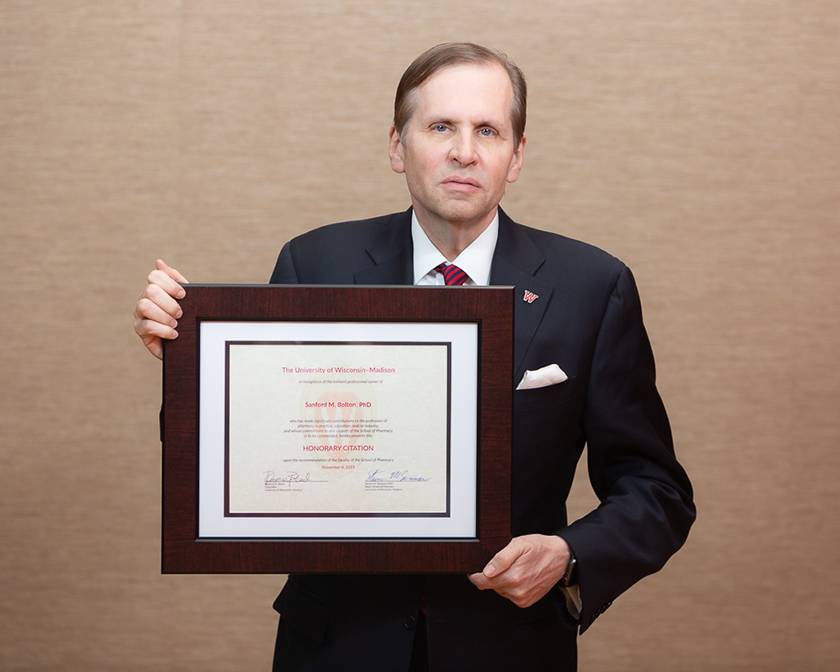
“It’s magnificent that he is being honored with the Citation of Merit because of his absolute love for the School of Pharmacy and career path of pharmacy,” says Goldman. “It’s important to us that he’s getting recognition for his wonderful contributions to pharmacy, as a teacher and inventor who continued to reinvent himself.”
Bolton was born in Newark, New Jersey, in 1929, where he earned his bachelor’s degree in pharmacy from Rutgers University before enrolling at the UW–Madison School of Pharmacy to pursue his master’s and PhD degrees under famed Professor Takeru Higuchi — known as the father of physical pharmacy.
“He loved his experience at Wisconsin and spoke highly of his student and alumni experience,” says Goldman. “It was a very important part of his education, and he expanded on that foundation.”
After graduating from the School, he took his first faculty position with the University of Rhode Island, where he used his sabbatical to earn a second master’s degree, in biostatistics, from Columbia University.
“With that degree, Sandy helped make pharmaceutical statistics a more prominent field,” says Goldman.
He consulted with major pharmaceutical companies, helping to design drug studies, and held senior positions at Endo Labs, Lever Brothers Research, and U. S. V. Labs before returning to academia in 1980, this time as a professor and chair of the pharmacy department at St. John’s University College of Pharmacy and Health Sciences in New York.
“Sandy taught pharmacy and advised students who became pioneers and legends, including Ernest Mario, after whom the Rutgers School of Pharmacy is named,” says Goldman. “He was a wonderful teacher and mentor. He joined forces with a former student to develop technology and went on to license the technology to a pharmaceutical company. The pharmaceutical company then commercialized the technology for several drugs that generated approximately $1 billion in sales.”
Bolton was still filing patents in the late 1990s and working with startup companies into his early 80s, before passing away in 2011.
“Sandy had a brilliant mind that transcended pharmacy and pharmaceutical science. We’re in awe of him and his legacy of a successful and accomplished life.”
—Eric Goldman
Goldman says the Boltons’ generosity was inspiring. The couple supported many institutions, including Columbia University and the University of Wisconsin, and provided educational scholarships to students at Rutgers, St. John’s, and the University of Arizona.
“His thoughtful giving philosophy impacted so many people and continues to give,” says Goldman. “He had many beneficiaries in his will — charities and individuals — many of whom have expressed how the Boltons nurtured their development, supported them, and were their second parents. It’s incredible to see the individual impact of two people spread out; it has a huge ripple effect.”
The Boltons also left a legacy at the School of Pharmacy, creating a distinguished graduate fellowship for students in the Pharmaceutical Sciences PhD program. The fellowship, in its inaugural year, is supporting two students: Dylan Sebo and Ke Wang.
But his generosity and inventiveness is only part of Bolton’s claim to fame. In 1964, he challenged chess legend Bobby Fischer. In fact, on that day, 47 people had the opportunity to play simultaneously against Fischer. Of them, 44 lost, one won, and two drew. Bolton was one of the two who drew.
“Sandy had a brilliant mind that transcended pharmacy and pharmaceutical science,” says Goldman. “We’re in awe of him and his legacy of a successful and accomplished life.”
Jeanette Roberts
Medicinal chemist and leader in pharmacy education
Jeanette Roberts came to Wisconsin in 2003 to lead the School of Pharmacy as dean for 11 years. When she arrived, Rennebohm Hall was only two years old, which left Roberts to prioritize impacting the people inside the building — students, faculty, and staff — through fundraising campaigns.
“Fundraising is always more effective when you share a vision with prospective donors that aligns with their passions and invites them to become engaged in a new way,” she says.
This shared vision led her to launch the People and Programs fundraising campaign and raise over $22 million to support School of Pharmacy students, faculty, and staff. Roberts also established the School of Pharmacy’s Office of Global Health and expanded PharmD students’ opportunities to study overseas.
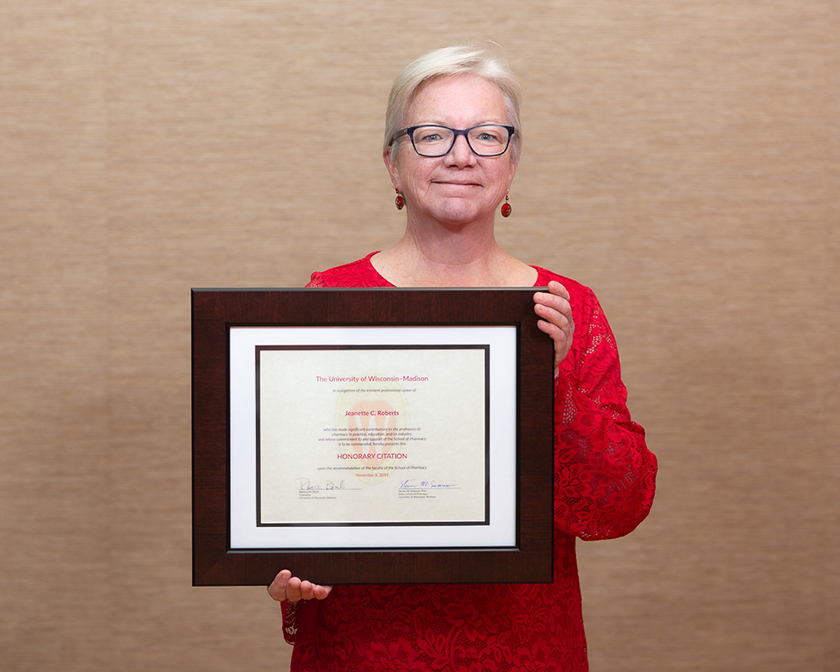
As dean, Roberts also formed a partnership with St. Vincent de Paul to start the first charitable pharmacy in the state that provides free medications, sourced in part from the Dispensary of Hope in Tennessee, to low-income people without health insurance.
“Dispensary of Hope is a nonprofit organization that coordinates medicine donations from manufacturers and supplies virtually unlimited free medication for uninsured patients to a network of free clinics, charitable pharmacies, and health systems,” explains Roberts, who now serves on Dispensary of Hope’s National Advisory Council.
After serving as dean of the School of Pharmacy for from 2003 to 2014, Roberts taught in the Pharmaceutical Sciences Division and served as the first director of the UW–Madison Center for Interprofessional Practice and Education, a cross-campus collaboration that prepares students to be effective members of health care teams.
Roberts retired from the School of Pharmacy in December 2018 and spends her time volunteering and traveling. In addition to her leadership role with Dispensary of Hope, she is the president of the Friends of Wisconsin Public Television, serves on her alma mater Albright College’s Board of Trustees, and serves on the Board of the BioPharmaceutical Technology Center Institute, Promega’s educational initiative.
“I loved working with students and miss that the most,” she says of her time as dean. “My other favorite part of the position was alumni relations, which led me around the world. Wherever I went, I met Badger pharmacy alums and got to hear about what they did with their education and how much they adore UW–Madison and the School of Pharmacy.”
In addition to her numerous contributions in leadership and education, Roberts is also an exceptional medicinal chemist. She earned a bachelor’s degree in biochemistry from Albright College in Reading, Pennsylvania, where she did undergraduate research in labs at the University of Delaware and Argonne National Laboratory. She was a chemist for the Minnesota Department of National Resources before earning her PhD in medicinal chemistry at the University of Minnesota and spending two years at Los Alamos National Lab in New Mexico.
“It’s a distinct honor to be listed among those past and present recipients of a Citation of Merit. I can’t tell you what a joy it was to serve as your dean.”
—Jeanette Roberts
Her research revolved around a molecule called glutathione, which acts as a protective agent that dismantles potentially toxic molecules and defends cells from oxidative damage. She created a prodrug of cysteine, one of three amino acids that compose glutathione, which becomes an active drug once it is broken into pieces by the body. Her prodrug releases cysteine and supports the production of glutathione in order to protect the body from toxic effects.
Building on her successful research program, Roberts became a professor and administrator at the University of Utah College of Pharmacy, where she remained until she received a call from Emeritus Professor Dan Rich, who was chairing the search committee for the UW–Madison School of Pharmacy dean position. “The rest is history,” she says.
The Citation of Merit is only the latest in a long line of professional accolades, including becoming one of six health professionals nationwide selected for the Robert Wood Johnson Foundation Health Policy Fellows program in 2015 and being named a fellow of the American Association for the Advancement of Science (AAAS), the world’s largest general scientific society, in 2017. The honor recognized her research in chemoprevention and chemoprotection (protecting the body from toxic agents or situations, including cancer) as well as her long-time service to AAAS and her leadership as dean of the School of Pharmacy.
However, the Citation will stand out on Roberts’ shelf.
“I was on the opposite side of this process for 11 years as dean, honoring the incredible contributions of our alumni and friends to pharmacy practice and research,” says Roberts. “It’s a distinct honor to be listed among those past and present recipients of a Citation of Merit. I can’t tell you what a joy it was to serve as your dean.”
Thomas Rosanske (PhD ’79)
Pharmaceutical industry advisor and mentor
Like many younger siblings, Thomas Rosanske idolized his older brother, Richard, who was nine years ahead of him in school and earned degrees in chemistry from UW–Oshkosh and Florida State University. “I remember when he brought me to his lab at UW–O and showed me some of the things they were doing, which sparked my interest,” says Rosanske.
Rosanske followed in his brother’s footsteps, earning a bachelor’s degree in chemistry from UW–Oshkosh in 1972 and a master’s degree in analytical chemistry from UW–Madison in 1975, before enrolling in the UW–Madison School of Pharmacy’s PhD program in pharmaceutics, studying under then-Professor Kenneth Connors.
Some of Rosanske’s fellow chemistry graduate students were entering the pharmaceutical industry, and, after he expressed an interest in pharmaceutical-related research, his advisor introduced him to Connors, who was doing analytical work at the School of Pharmacy.
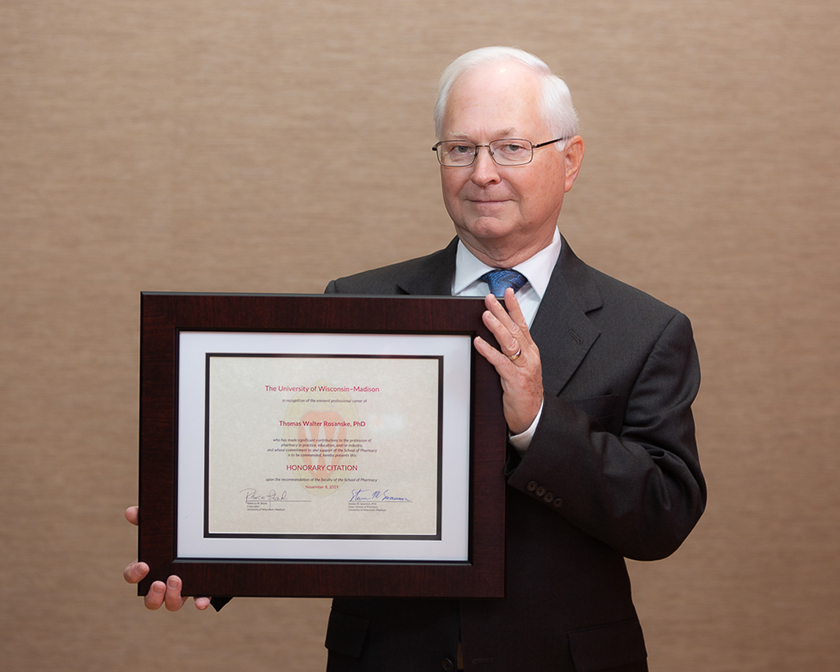
“Everything fell into place,” Rosanske recalls. “Pharmacy was always at the back of my mind. In high school, a local pharmacist in Oshkosh took a few students to Madison to visit the School of Pharmacy, sit in on classes, and see what it was like, and I thought that was pretty cool. Pharmacists enhance people’s quality of life, and the idea of helping and training people really resonated with me. I was interested in the research side of pharmacy.”
At the School, Rosanske describes a caring community that was also composed of powerhouse scientists.
“The faculty in the School of Pharmacy when I was a graduate student were among the pioneers of modern pharmaceutics,” says Rosanske. “What we have today is largely built on the foundation they laid. George Zografi, Ken Connors, Gordon Amidon, Joe Robinson, Jens Carstensen, and Pasu Mukerjee, among others, were giants in pharmaceutics — that became evident once I was out in industry — and I am fortunate to have had them lead me through my graduate coursework and studies.”
After graduate school, Rosanske went to work as a research scientist at Upjohn, a pharmaceutical manufacturing firm now owned by Pfizer, where he ran into many other Badgers.
“The head of our division was a UW–Madison School of Pharmacy grad, my immediate supervisor was also a student of Dr. Connors, and I worked across the hall from a Joe Robinson student — everywhere I went, from meetings to universities, there was a School of Pharmacy connection,” says Rosanske. “All I had to do was mention that I was from the UW, and people took note. The power and reputation the School had in the industry made it easy for me to go places and get things done.”
“It is especially rewarding that this award comes from a school with the reputation of the UW–Madison School of Pharmacy. I’m truly honored.”
—Thomas Rosanske
In fact, when Robinson was president of the American Association of Pharmaceutical Science (AAPS), Rosanske called him and expressed interest in serving on an AAPS committee.
“Two weeks later, the chair of the analytical section called and offered to put me on a committee and invited me to run for section secretary/treasurer,” says Rosanske. “I won the election, became secretary/treasurer, then vice chair, then chair. That led to my serving on the AAPS executive committee, which opened all kinds of doors for my career.”
Rosanske held many scientific and executive roles at pharmaceutical companies during his career, moving from Upjohn to Marion Laboratories (which became Marion Merrell Dow, followed by Hoechst Marion Roussel) to become a manager and then a department head, and then to Quintiles, Inc., where he was executive director and then vice president of analytical chemistry. Rosanske also held director roles at Eli Lilly and Company; Cardinal Health; PPD, Inc.; and Acceleration Laboratory Services, Inc., before becoming a managing director and executive consultant at Cardinal Health Regulatory Sciences. He retired in 2017 but still volunteers as an executive advisor for Excite Pharma Services.
Throughout his career, he made mentoring a priority, urging the importance of listening, leading, and developing strong collaborative relationships with colleagues, qualities he says he learned from Connors.
“I’ve never looked for credit or honors, especially something as esteemed as the Citation of Merit, but my satisfaction has always come from seeing people I worked with and mentored succeed and get recognized for their achievements, and thinking maybe I played a role in their success,” Rosanske says. “When I look back at some of the other people who have received this award, it’s mind-blowing that my name is now listed among them; it is especially rewarding that this award comes from a school with the reputation of the UW–Madison School of Pharmacy. I’m truly honored.”
Arthur Schuna (BS ’73, MS ’75)
Ambulatory care and residency pioneer
Growing up in Clear Lake, Wisconsin, Arthur Schuna remembers going to Chet Johnson and Sons Pharmacy in Amery, Wisconsin.
“I was impressed with the pharmacists’ abilities and skills in helping people to get better, and it made me want to do the same,” says Schuna. “They took me down to Madison to attend a career day at the School of Pharmacy, and we toured the building and sat in on lectures.”
Schuna dreamed of following in the Johnson family’s footsteps and owning a community pharmacy. Then, as an undergraduate intern at Werts’ Pharmacy on Monroe Street in Madison (now Neuhauser Pharmacy), he began hearing about the early expansion of clinical pharmacy practice to outpatient settings and was excited about the opportunities.
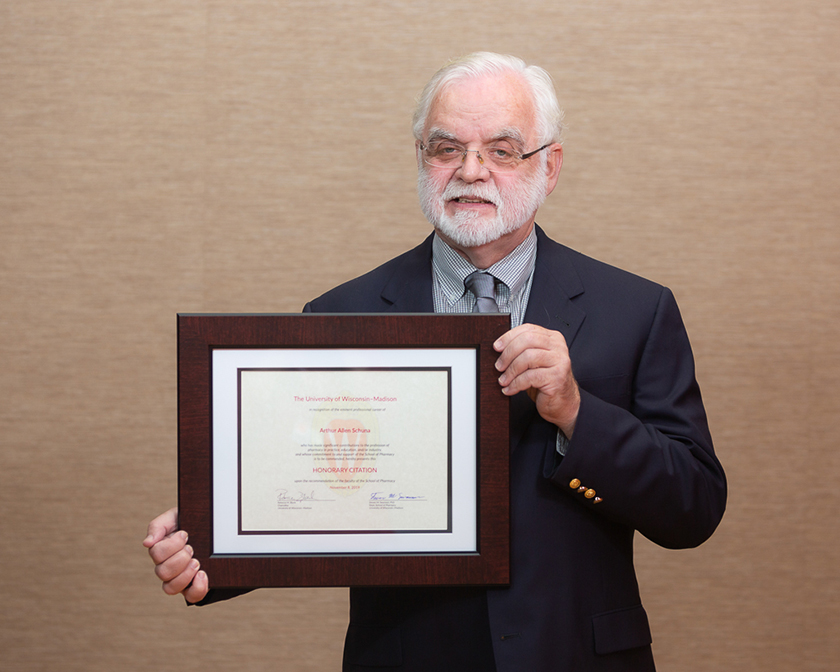
For example, in 1972, the Indian Health Service (IHS) eliminated paper prescriptions and wrote drug orders in patients’ medical charts instead, so when patients filled prescriptions, the pharmacist could access their medical records. The next year, a journal article was published describing a new therapeutic monitoring program for patients at the Cass Lake, Minnesota, Indian Reservation clinic.
“They were pioneering ambulatory practice at the time,” Schuna says. Intrigued, he applied to become a pharmacist with the Indian Health Service in 1973.
But when Schuna didn’t pass his Coast Guard physical, which at the time was required to work for the IHS, he was forced to reconsider his options. At the encouragement of his faculty advisor David Angaran, the School of Pharmacy’s first clinical professor, Schuna applied to the UW Health combined residency and master’s degree program and was accepted.
When the School of Pharmacy’s second clinical professor, Cab Bond, arrived in Madison, he began working with Roberta Monson, the head of the rheumatology clinic at the William S. Middleton Memorial Hospital in Madison.
“He was the first clinical pharmacist to practice in clinic at the VA and did such a good job, the VA decided to create a position to develop ambulatory care practice,” explains Schuna, who applied and got the new job. “It was a unique position at the time.”
Eight years into Schuna’s role at the VA, in 1983, the American Society of Health-System Pharmacists (ASHP) created the first specialty ambulatory care residency in the country and hired Schuna to run it. In his 33 years as director, he trained 164 residents.
“When I developed the residency program, I wanted to make sure teaching was an important part of our residency training,” Schuna says. “Teaching experience was an important part of my training and something I wanted to pass on to others.”
“I know from working with UW students for over 41 years that they’re a highly motivated, intelligent group of people, most of whom I would qualify as high achievers, and it’s an honor to be selected from this terrific pool of candidates.”
—Arthur Schuna
Schuna taught for his entire career, holding roles as a clinical instructor and then a clinical professor in the School of Pharmacy. While director of the PGY1 general practice and ambulatory care and the PGY2 ambulatory care residency programs, he also developed and expanded ambulatory care services at the VA and created direct patient care practice roles in the rheumatology, hypertension, and diabetes clinics.
By the time he retired in 2016, Schuna had worked in rheumatology and hypertension clinics for 41 years. The medications that were used to treat patients at the beginning of his career were no longer recommended by the end.
“Lifelong learning habits are important, and I tried to ingrain the importance of this in residents and students,” Schuna adds. “In school, professors feed you information, and you absorb it. As you get older, self-directed learning needs to be a habit to stay at the top of your field.”
On a national level, Schuna served on the pharmacy residency advisory group that develops policy for VA residencies, was chair of the ASHP primary and ambulatory care special interest groups and a member of the ASHP Commission on Credentialing, where he conducted residency site surveys. He helped develop ambulatory care residency standards and the petition for board certification of ambulatory care pharmacists with the Board of Pharmacy Specialties. He’s also co-authored more than 40 papers in scientific journals and wrote the rheumatoid arthritis chapter for the first 10 editions of the widely used textbook Pharmacotherapy: A Pathophysiology Approach.
Since he retired, Schuna has had time to turn his full attention to music. He’s hosted a radio show on WORT-FM in Madison, Two for the Blues, for 24 years and is an avid record collector and reader.
“I was amazed to learn from Professor Dave Mott that I’d been nominated, much less chosen, for a Citation of Merit,” says Schuna. “I know from working with UW students for over 41 years that they’re a highly motivated, intelligent group of people, most of whom I would qualify as high achievers, and it’s an honor to be selected from this terrific pool of candidates.”
